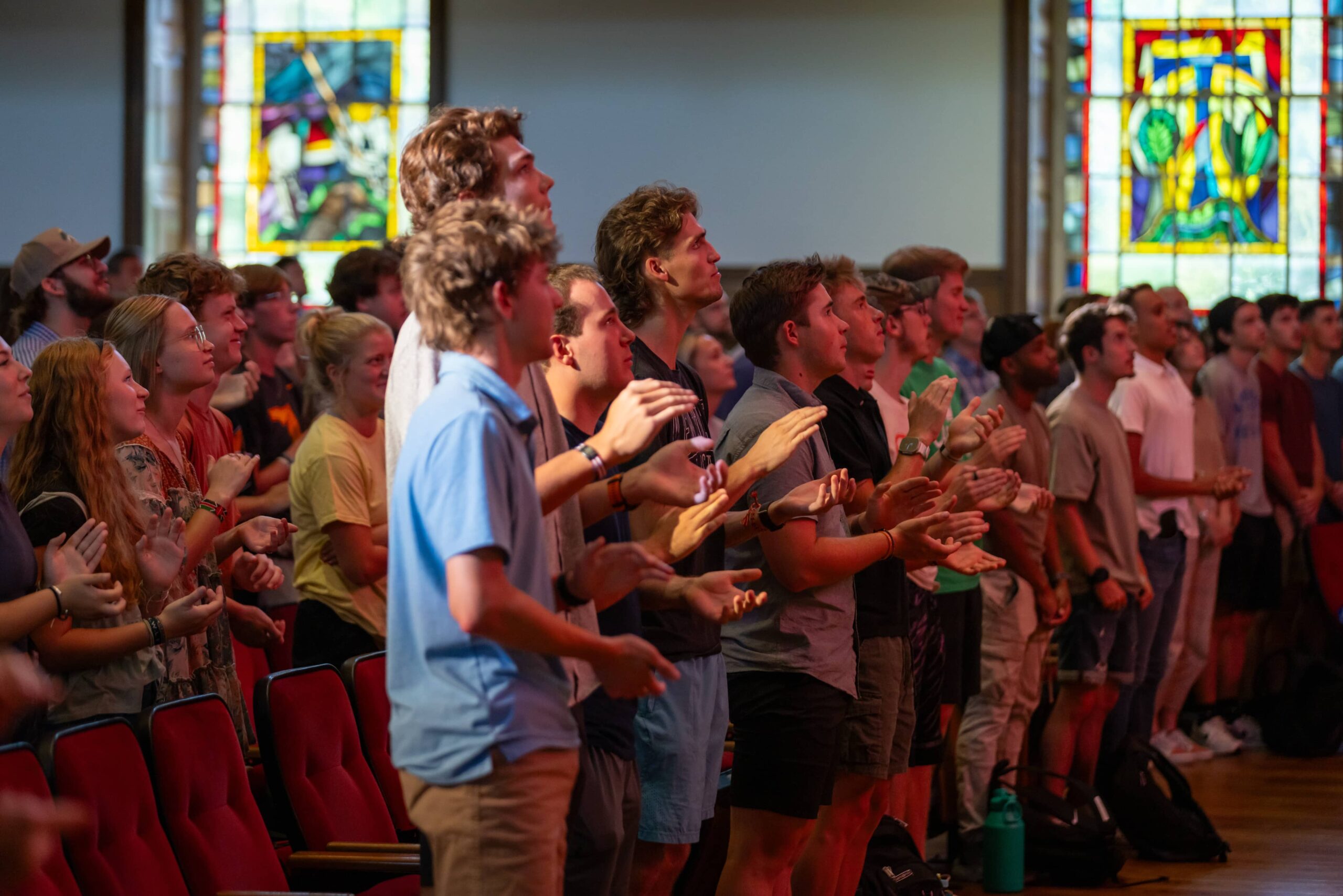Why Study Cybersecurity at Milligan?
Milligan University’s cybersecurity major is part of the William B. Greene Jr. School of Business & Technology, an academic hub that prepares students for impactful careers. Rooted in Milligan’s mission to foster servant leadership, this program offers personalized faculty support, small class sizes, and access to cutting-edge resources for those pursuing a major in cybersecurity. The curriculum emphasizes technical skills and the ethical considerations essential to cybersecurity, helping students develop a well-rounded understanding of this vital field.
WILLIAM B. GREENE JR., SCHOOL OF BUSINESS & TECHNOLOGY
BACHELOR OF ARTS, BACHELOR OF SCIENCE, MINOR IN CYBERSECURITY
I have had several classes that have prepared me for technical interviews. Dr. Choi, Professor Carpenter, Professor Giblin, and Professor Griffith have ensured to put the important aspects of my degree first so that I will be successful in my future career.”
Alexander Stephens

Career Paths with a Cybersecurity Degree
Graduates from Milligan’s cybersecurity program are well-prepared to pursue a wide range of in-demand careers, armed with the skills and knowledge needed to excel in the ever-evolving field of cybersecurity.
Potential Careers
Information Security Analyst
Develop and implement strategies to protect organizations from threats.
Penetration Tester
Network Security Engineer
Cyber-security Consultant
Advise businesses on safeguarding their digital assets.
Digital Forensics Specialist
Investigate data breaches and recover compromised information.
Incident Response Analyst
Manage and mitigate the effects of cybersecurity breaches.
The cybersecurity curriculum utilizes a multi-disciplinary approach that provides students with educational nuances and hands-on experiences. Milligan’s cybersecurity students are expected to apply themselves as this will predicate a successful outcome diligently. Students will experience a rigorous but rewarding program that introduces information technology while incorporating humanities, arts, and culture to develop a foundationally sound approach, resulting in a comprehensive view of how, although singular, they are adjacent and interconnected. The cybersecurity program has a traditional four-year program and a three-year option.
Mission Statement
Provide an exceptional cybersecurity education that will prepare students to be servant-leaders in their families, community, and industry where the assimilation of the Christian faith, information technology, technical skills, and social stewardship within the experience at Milligan University comes full circle. Deliver regional and non-regional organizations with highly qualified graduates whose developed cybersecurity skills allow them to approach challenges ethically, assertively, and professionally.
Cybersecurity Core Courses (57-58 hour major)
CS 201 – Computer Organization and Architecture (3)
CS 211 – Programming Logic (3)
CS 230 – Information Assurance and Security (3)
CS 297 – Object Oriented Programming (3)
CS 301 – Operating Systems (3)
CS 307 – Data Structures (3)
CS 320 – Networking and Communications (3)
CS 313 – Advanced Programming (3)
CS 350 – Analysis of Algorithms (3)
COMM 305 – Specialized and Technical Writing (3)
IS 305 – Database Management (3)
IS 332 – Legal, Ethical, and Privacy Issues (3)
Math 211 – Calculus I (4) or Math 213 – Statistics (3)
MATH 302 – Discrete Math (3)
Cybersecurity-specific courses
CS 330 – Computer Forensics (3)
CS 327 – Ethical Hacking (3)
CS 425 – Network Security (3)
CS 410 – Systems Administration (3)
One technical elective* (3)
* Chosen in consultation with an advisor
Computer Requirements
Windows-based computer running Windows 10 or above for use in undergraduate cybersecurity courses.
The three-year Bachelor’s degree option accelerates the traditional undergraduate process and is perfect for highly motivated students. With an academically rigorous schedule, students save time and reach the workforce or graduate school earlier while still gaining the skills and experience their career paths demand. You can still engage fully in campus life — be an athlete, lead a club, complete an internship (or two), conduct research with a professor, and participate in all the Milligan traditions.
Graduating in three years requires full-time enrollment for three consecutive fall and spring semesters and two summer terms, as outlined in the chart below. You’ll complete a total of 128 credits, including core curriculum, major, and optional minor or elective courses. Dual enrollment or AP credits may reduce your load or the need for some summer sessions in the undergraduate cybersecurity program.
Cybersecurity Faculty
Frequently Asked Questions
What Skills Will I Gain from Milligan's Cybersecurity Major?
The cybersecurity major at Milligan equips students with technical knowledge and problem-solving abilities to address modern security challenges. You’ll gain experience in network security, cryptography, pentesting, digital forensics, network administration, Linux, cloud systems, and Cisco.
Beyond technical skills, the program focuses on developing critical thinking, teamwork, and ethical decision-making, ensuring you’re ready for leadership roles. Milligan emphasizes hands-on learning and real-world applications, helping students confidently protect digital systems and sensitive information. The program combines technical rigor with a focus on values, preparing graduates to approach cybersecurity challenges with professionalism and integrity.
Does This Program Include Real-World Experience?
Yes, Milligan’s cybersecurity major integrates real-world experience into the curriculum. Students participate in lab-based courses, collaborative projects, and simulations that mimic professional cybersecurity scenarios. Opportunities to engage in internships through Milligan’s partnerships with businesses and organizations allow students to apply their skills in real environments. These experiences provide valuable insights into cybersecurity professionals’ challenges and prepare students to enter the workforce confidently. Whether testing networks for vulnerabilities or designing secure systems, students leave the program with the practical experience needed for success.
Are There Certification Opportunities Within the Program?
Milligan’s cybersecurity major aligns its coursework with industry-recognized certifications, giving students a significant advantage in the job market. Certifications like CompTIA Security+, Pentest+, Network+, and more are woven into the program, allowing students to build expertise while preparing for these credentials. Earning these certifications demonstrates proficiency and dedication, helping graduates stand out to employers. Faculty members guide certification pathways, ensuring students have the knowledge and skills to succeed. This focus on certification readiness underscores Milligan’s commitment to preparing students for meaningful careers in cybersecurity.
What Types of Careers Can I Pursue with This Degree?
Graduates from Milligan’s cybersecurity major are prepared for roles across various industries. Career options include:
-
Information Security Analyst – Responsible for protecting an organization’s computer systems and networks from potential threats. This involves monitoring security systems, identifying vulnerabilities, implementing security measures, and responding to security breaches to ensure data and systems remain safe.
-
Network Security Engineer – Specializes in designing, implementing, and maintaining secure communication infrastructures critical to the field of science in cybersecurity. This role involves configuring firewalls, managing virtual private networks (VPNs), and ensuring all data transmitted across networks is secure from unauthorized access.
-
Pentester – Conducts authorized testing of systems and networks to identify vulnerabilities and weaknesses before malicious hackers can exploit them. Pentesters help organizations strengthen their security measures and improve overall defenses by simulating attacks.
-
Incident Response Analyst – This position focuses on managing and resolving security breaches or cyberattacks when they occur. This includes identifying the nature of the attack, minimizing damage, recovering affected systems, and implementing strategies to prevent similar incidents in the future.
-
Digital Forensics Specialist – This role Investigates and analyzes cyberattacks or data breaches by collecting and examining digital evidence. It often involves determining the cause of the attack, identifying the attackers, and providing insights to help prevent future incidents.
-
Cloud Security Specialist: This position ensures the protection of sensitive data and systems stored in cloud environments, which is crucial for security professionals. It involves implementing security protocols, monitoring cloud systems for threats, and working with cloud service providers to maintain robust security standards.
These careers offer opportunities to safeguard digital assets while contributing to organizational success.
How Does Milligan Support Students in Finding Internships and Jobs?
Milligan University prioritizes connecting students with meaningful career opportunities. Through partnerships with businesses and organizations, students gain access to internships that provide practical experience in cybersecurity. The university’s career services offer resume support, interview preparation, and networking events to help students build professional connections. Faculty members also mentor students throughout their academic journey, guiding them toward pursuing internships and roles that align with their career goals. This comprehensive support ensures that students graduate with the confidence and resources to launch successful careers.
What Is the Student Experience Like in This Program?
Milligan’s cybersecurity major students benefit from small class sizes and close faculty mentorship. The program fosters a collaborative environment where peers and professors work together to tackle challenges and build knowledge. Milligan’s mission-driven approach encourages students to grow academically, personally, and ethically. The supportive campus community and state-of-the-art facilities ensure that students have the resources they need to thrive. Milligan’s Bachelor of Science in Cybersecurity creates a meaningful and enriching educational experience by balancing technical rigor with community-focused learning.
Why Is Ethical Training Part of the Cybersecurity Major?
Ethics are central to Milligan’s cybersecurity major because cybersecurity professionals often face decisions that impact privacy, safety, and trust. The program’s focus on ethical decision-making reflects Milligan’s mission to produce servant-leaders who act with integrity. Through coursework and discussions, students learn to navigate the complexities of their roles responsibly. Ethical training helps graduates understand the broader implications of cybersecurity, ensuring they can protect systems and data while respecting the individuals and organizations they serve.








